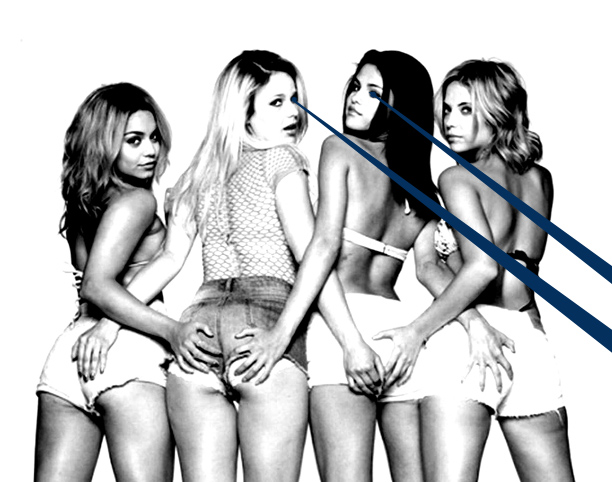Harmony Korine is pretty rad for a white dad
Harmony Korine turned 40 this year. Where did the time go? His career, like Abel Ferrara’s, has remained surprisingly durable, given how quickly he earned his rep as a user, a rebel rouser, an enfant terrible. He’s charmed, a filmmaker who lived to tell the tale and may be bankable because of—not despite—all the hijinks, from attempting to steal Meryl Streep’s purse in the David Letterman green room to shooting coverage with needles in his arm.
Since his earliest days working with the late cinematographer Jean Yves-Escoffier, who gave his first films their half-verite, half-hallucinatory feel, Korine never been terribly interested in doing things traditionally. He’s a mise-en-scene-first formalist, a director for whom the integrity of the shot trumps most other aesthetic concerns. In this way he’s always been a grown up director in this way, even as he represented some sort of eternal, misbegotten boyhood.
Anyone who grew up watching KIDS—the seminal independent film that kept Lynn Cheney up at night, worried that the children of America would soon be smoking blunts while getting HIV from passed-out fashion models—associates Mr. Korine with the sublimities of damaged youth in the moment before New York got Disneyfied. Now, Korine's casting Disney girls, and entering his fifth decade on earth. Is his first shot at the mainstream is another subversion? Or does he have something bigger on his mind this time?
While Larry Clark’s two interpretations of Korine’s writing, KIDS and 2002’s Ken Park, have more explicitly maudlin and condemnatory viewpoints on a very pre-9/11 malaise and self-destructive disaffection amongst teens in the city and suburbs respectively, Korine’s own body of directorial work, with rare exception, has a steadfast ambiguity toward its characters and the societies they inhabit. Spring Breakers proves the rule.
It’s hard to shake your prejudices against the deformed and the merely stupid, the back country and the strip mall parking lot, the people and places that often populate Korine’s work. The brokenness of the places he chooses to explore is our perception, though, not his; he seems to relish the putative depravity of his many milieus, suggesting that what’s prima facie reprehensible has an aesthetic value that trumps conventional moralizing. If the work of his champion and one-time collaborator Werner Herzog truly found its mature phase in the jungles of the Amazon, the perfect setting for him to explore his particular thematic concerns, it is in the beer-soaked beaches of Florida where Korine, now the age that Herzog was when he made Fitzcarraldo, was always destined to find the stage for his own vision of the beautiful, fallen west.
Spring Breakers is already Korine’s highest-grossing film and easily his most digestible. It’s a built-for-maximum-glide fever dream, The Real Cancun meets Hype Williams’ Belly, a slippery movie that hints at having something fully formed to say about the appropriation of black culture by white youth before pulling back and solving its narrative riddle with gangland fantasia. He gives us a quartet of non-black Kentucky college students who count amongst them a pair of young women can’t pay attention during lecturers about the Jim Crow south and another who who quickly falls apart in unwarranted fear once they encounter a real (if most benign and non-threatening) African-American majority space. Armed robbery of chicken joints and titty shaking to hip-hop with buff white dudes is their jam before a stint in the slammer exposes them to a grand guignol wigger (James Franco, never better) who transforms them into a gat totting, ski mask rocking girl gang who steal from and kill black gangsters with little provocation. How can this not be meant to mean, well, something? Most observers seems to either focus entirely on these aspects of the film’s narrative or ignore them almost completely.
Yet Korine’s newest film features little in the way of psychological realism, fully rounded characters, a stakes-driven narrative, or any of the elements that would make Spring Breakers thematic concerns more palatable. Given his oeuvre, this isn't a pejorative; most of Korine’s movies have even fewer of these qualities than does Breakers. Candy-colored tone poem that it is, Breakers refuses to fully engage us in a way that would bring Korine’s own motives and ideological stance into focus, even if he gleefully told Filmmaker Magazine recently he’d rather hang out with black people than white. Is, Korine a social critic or simply a prankster? Are we supposed repulsed by the decadence and immorality of this modern sodom or seduced by the movie’s exuberance and undeniable visual panache? Is to say “both” a cop out? It’s embrace of characters who are ciphers, played by ex-Disney teen dreams trying to pull a Liz Berkley as John Podheretz would have it, (you know you’ve hit the big time, indie filmmakers, when The Weekly Standard is lobbing bombs at you), peg it as another postmodern stunt from Korine?
These questions don’t have tidy, compact answers. It seems to me that Korine has little interest in analyzing American cultural mores and dramatizing their contradiction—he’d rather just have a highly polished laugh about it all, but one where he does just enough staring into the abyss to make you wonder if he’s asking you to be critical.
You never sense him condescending to his characters though, be they backwoods Tennessee midgets in Gummo, or variegated grotesques Trash Humpers. Instead, you get the idea he thinks they’re fuck-ups trapped in an irreparable world. It takes one to know one. Korine doesn’t care what you think of him, and he doesn’t care what you think of his characters. He’s getting off simply by making you inhabit their unreality. Whether you should indulge him is for you to decide. But don’t expect this Rubix Cube to have a solution. If it does, it’s likely your own, not Korine’s.

